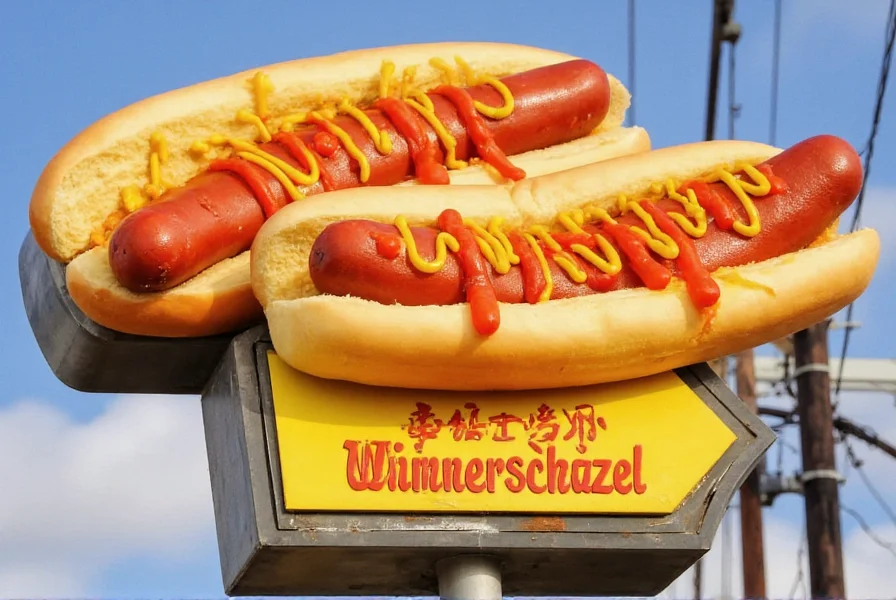Many people searching for wienerschnitzel chili sauce encounter confusion between two completely different culinary concepts. This article clarifies the distinction between authentic Austrian wiener schnitzel and the American fast food chain Wienerschnitzel, explaining why chili sauce doesn't belong on the traditional Austrian dish but appears in the fast food context.
Understanding the Wiener Schnitzel Confusion
The term "wiener schnitzel" (two words) refers to Austria's national dish: a thin, breaded, and pan-fried veal cutlet. Authentic wiener schnitzel originates from Vienna ("Wien" in German), hence "wiener." In contrast, Wienerschnitzel (one word) is an American fast food chain founded in 1961 that specializes in hot dogs ("wiener" referring to the hot dog, not the city).
This linguistic overlap creates widespread confusion. When people search for wienerschnitzel chili sauce, they're often mixing elements from both contexts without realizing they're fundamentally different.

What Is Authentic Wiener Schnitzel?
True wiener schnitzel follows strict preparation guidelines established in Austrian culinary tradition:
- Made exclusively with veal (not pork or chicken, which would be called "schnitzel" without "wiener")
- Breaded using the "three-bowl method" (flour, egg wash, breadcrumbs)
- Pan-fried in clarified butter until golden brown
- Served immediately with a lemon wedge
The Austrian Ministry of Agriculture even established official guidelines in 2009 defining authentic wiener schnitzel. Any variation using different meats or preparation methods cannot legally be called "wiener schnitzel" in Austria.
Traditional Accompaniments for Wiener Schnitzel
When served in Austria or authentic Austrian restaurants worldwide, wiener schnitzel comes with specific traditional sides that complement its rich flavor:
| Traditional Side Dish | Purpose | Regional Variation |
|---|---|---|
| Lemon wedge | Cuts through richness with acidity | Universal | d
| Potato salad | Cold salad balances fried texture | Viennese style with broth dressing |
| Cucumber salad | Refreshing contrast | Common in western Austria |
| Braised red cabbage | Sweet-tart complement | Eastern Austria/Bavaria |
No traditional Austrian recipe includes chili sauce with wiener schnitzel. The dish's delicate flavor would be overwhelmed by the bold, spicy-sweet profile of American-style chili sauce.
Why the Chili Sauce Confusion Exists
The wienerschnitzel chili sauce misconception stems entirely from the American fast food chain Wienerschnitzel (one word). Despite its name referencing the Austrian dish, this California-based chain serves hot dogs ("wieners"), not schnitzel.
At Wienerschnitzel restaurants, chili sauce is a standard topping for hot dogs and other menu items. When people see "Wienerschnitzel" on a restaurant sign and order "chili sauce," they mistakenly associate it with the Austrian dish.

Authentic Sauces for Wiener Schnitzel
While traditional wiener schnitzel stands perfectly well on its own with just lemon, some Austrian variations include specific sauces:
- Jägerschnitzel: Served with mushroom gravy ("Jäger" means hunter)
- Zigeunerschnitzel: Topped with bell pepper, tomato, and onion sauce ("Zigeuner" refers to Romani people)
- Creamy caper sauce: A modern variation using capers, parsley, and cream
These sauces complement rather than overwhelm the delicate veal flavor. None contain chili or tomato-based elements that would clash with the dish's traditional preparation.
When Might Chili Sauce Appear with Schnitzel?
In non-traditional contexts, some American or fusion restaurants might offer creative interpretations:
- Pork or chicken schnitzel: More robust meats might pair with bolder sauces
- Tex-Mex fusion dishes: Where schnitzel replaces traditional protein in nachos or tacos
- Fast-casual reinterpretations: Some modern gastropubs experiment with global flavors
However, these are deliberate culinary innovations, not authentic Austrian preparations. If you're seeking traditional Austrian cuisine, chili sauce with wiener schnitzel would be considered inappropriate.
How to Order Authentic Wiener Schnitzel
When dining at an Austrian restaurant or establishment claiming authentic preparation, follow these guidelines:
- Look for "Wiener Schnitzel vom Kalb" (veal) on the menu
- Expect it served with lemon wedge and traditional sides
- Avoid restaurants offering ketchup, mustard, or chili sauce as standard accompaniments
- Ask about the cut of meat if unsure—true wiener schnitzel uses veal
Understanding these distinctions helps preserve culinary traditions while appreciating how dishes evolve in different cultural contexts. The search for wienerschnitzel chili sauce reveals how language and cultural adaptation can create delicious confusion.











 浙公网安备
33010002000092号
浙公网安备
33010002000092号 浙B2-20120091-4
浙B2-20120091-4